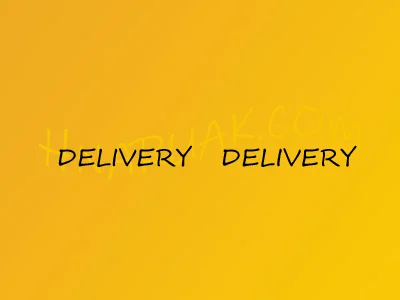The Delivery Con: Who Really Pays for Your 'Same-Day' Convenience
My phone buzzed with the update I’d been waiting for: “Your driver, Kevin, is approaching with your tacos.” I looked out the window into the rain. Kevin, a complete stranger, was risking slick roads and a miserable Tuesday night so I wouldn't have to put on shoes. And for this modern miracle, I was paying a "service fee," a "delivery fee," a "small order fee," and a "because we can fee," all before the tip.
This isn't convenience. This is a hostage situation we’ve all willingly entered.
We were promised a utopia of instant gratification, a world where anything from a single coffee to a week's worth of groceries could be summoned to our doorstep with a thumb-swipe. What we got instead was a parasitic ecosystem that’s actively devouring its hosts: restaurants, workers, and the very idea of a neighborhood.
The Ghost in the Kitchen
Remember restaurants? You know, those places with tables and chairs and a low murmur of conversation, where someone actually came to you and asked what you wanted? They’re becoming an endangered species. According to How Delivery Ate the Restaurant, nearly three out of every four restaurant orders are now eaten somewhere else. Dining rooms are turning into waiting rooms for gig workers in helmets.
One restaurateur put it perfectly: “Delivery saved us during the pandemic. Now they are killing us.”
It’s the classic Faustian bargain. Small businesses, desperate to survive, signed up with the slick tech platforms—DoorDash, Uber Eats, Grubhub. They got access to customers, sure, but they also handed over their margins, their customer relationships, and their souls to an algorithm. Chefs are now engineering "journey-proof" food, which is a sterile, corporate way of saying, "How do we make fries that don't turn into a sad, limp sponge after 25 minutes in a sweaty box?"
This isn't about food anymore. A restaurant that doesn't serve people, as writer Ellen Cushing notes, isn't really a restaurant. It’s a fulfillment center with a deep fryer. It’s a logistics node in the vast, impersonal network of what Derek Thompson calls “convenience maximalism.” It’s a system built for speed, not connection. And what are we losing in this trade? Are we really so busy that the act of sitting down for a meal has become an inefficiency to be optimized away?
The Price of Your Pizza is Someone's Livelihood
If you think the restaurant owners have it bad, try talking to the drivers. The whole `food delivery` and `amazon delivery` empire is built on a foundation of precarious, disposable labor. These people aren't employees with rights; they're "independent contractors," which is a fancy way of saying they have all the responsibilities of a job with none of the protections.

Just look at the story of the DPD drivers in the UK. The company, which raked in nearly £200 million in profit, decided to slash driver pay rates and cut their Christmas bonuses. We’re talking a loss of up to £8,000 a year per person. When about 1,500 drivers protested by, you know, not working for three days, DPD’s response was swift and brutal.
They started firing the "ringleaders."
One guy, Dean Hawkins, was fired for allegedly breaching a gagging clause in his contract. His crime? He posted on Facebook that DPD doesn't allow its drivers to have a voice. The company's logic is so twisted it's almost impressive: they create a "newsworthy event" by slashing pay, and then fire the guy who talks about it for participating in a "newsworthy event." You can't make this stuff up. Another contractor had his contracts terminated and was told DPD might keep his £16,000 deposit to cover the "costs" of finding his replacement. Offcourse they did.
This is a bad system. No, "bad" doesn't cover it—this is a five-alarm dumpster fire of corporate greed. These `delivery jobs` are a mirage. You’re a “partner” right up until the moment you become inconvenient. Just ask the 110 people who worked for JARDE LLC, an Amazon Delivery Service Partner that was shut down when Amazon "unexpectedly" terminated its contract. One day you have a job, the next you’re a line item in a WARN notice.
And before I can even participate in this exploitative chain by ordering a burrito, I have to navigate a dozen cookie consent pop-ups and prove to a machine that I can identify all the pictures with a bus in them. The irony is just...
We Ordered a Monster
Let's be real. We can blame the tech bros in Silicon Valley and the sociopathic MBAs in the boardroom all we want, but we’re the ones who fed this beast. We traded community for convenience, human interaction for a frictionless transaction. We wanted our ramen delivered in 30 minutes, and we didn't ask too many questions about how the sausage—or the ramen—got made.
The system isn't broken; it's working exactly as designed. It efficiently transfers wealth from small businesses and low-wage workers to massive tech platforms and their venture capital overlords. It turns our neighborhoods into a series of dark kitchens and our streets into a racetrack for underpaid drivers.
And for what? So we don't have to talk to another human being while we get our dinner? The bill for all this convenience is coming due, and it’s going to cost a hell of a lot more than a $3.99 delivery fee. Then again, maybe I'm just getting old and yelling at the clouds. God knows I'll probably fire up DoorDash again next week.
Tags: delivery
John Vincent's World Series Anthem: Explaining the Singer Everyone Had to Google
Next PostAnother Donut Chain Goes Bankrupt: And Why Nobody Cares
Related Articles
